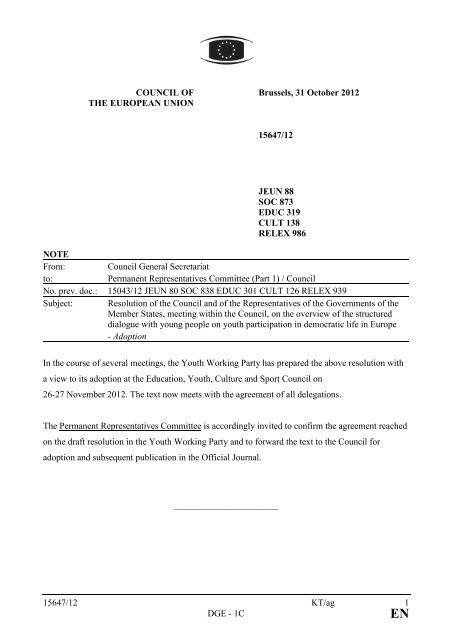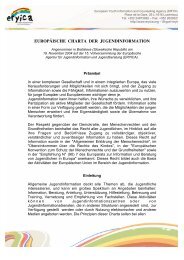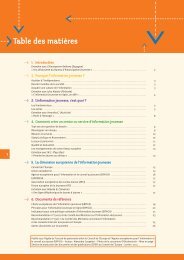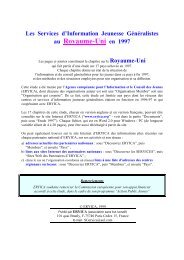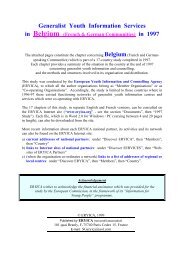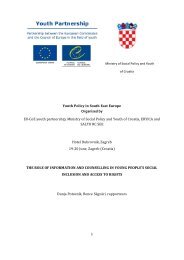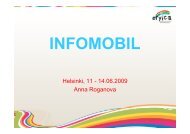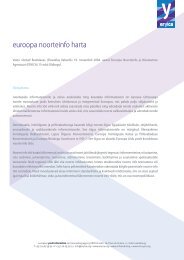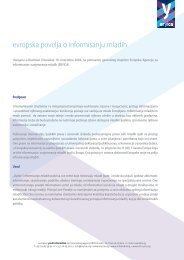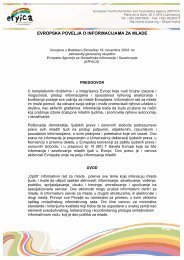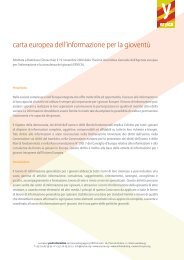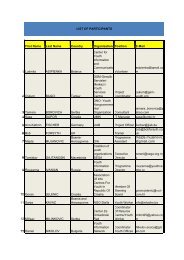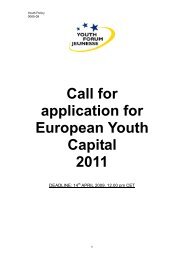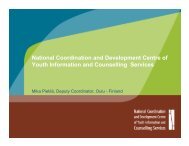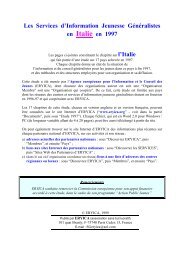15647/12 KT/ag 1 DGE - 1C COU CIL OF THE EUROPEA U IO ...
15647/12 KT/ag 1 DGE - 1C COU CIL OF THE EUROPEA U IO ...
15647/12 KT/ag 1 DGE - 1C COU CIL OF THE EUROPEA U IO ...
You also want an ePaper? Increase the reach of your titles
YUMPU automatically turns print PDFs into web optimized ePapers that Google loves.
<strong>COU</strong><strong>CIL</strong> <strong>OF</strong><br />
<strong>THE</strong> <strong>EUROPEA</strong> U<strong>IO</strong><br />
Brussels, 31 October 20<strong>12</strong><br />
<strong>15647</strong>/<strong>12</strong><br />
JEU 88<br />
SOC 873<br />
EDUC 319<br />
CULT 138<br />
RELEX 986<br />
OTE<br />
From: Council General Secretariat<br />
to:<br />
Permanent Representatives Committee (Part 1) / Council<br />
No. prev. doc.: 15043/<strong>12</strong> JEUN 80 SOC 838 EDUC 301 CULT <strong>12</strong>6 RELEX 939<br />
Subject: Resolution of the Council and of the Representatives of the Governments of the<br />
Member States, meeting within the Council, on the overview of the structured<br />
dialogue with young people on youth participation in democratic life in Europe<br />
- Adoption<br />
In the course of several meetings, the Youth Working Party has prepared the above resolution with<br />
a view to its adoption at the Education, Youth, Culture and Sport Council on<br />
26-27 November 20<strong>12</strong>. The text now meets with the <strong>ag</strong>reement of all delegations.<br />
The Permanent Representatives Committee is accordingly invited to confirm the <strong>ag</strong>reement reached<br />
on the draft resolution in the Youth Working Party and to forward the text to the Council for<br />
adoption and subsequent publication in the Official Journal.<br />
_______________________<br />
<strong>15647</strong>/<strong>12</strong> <strong>KT</strong>/<strong>ag</strong> 1<br />
<strong>DGE</strong> - <strong>1C</strong><br />
E
ANNEX<br />
Draft<br />
Resolution of the Council and of the representatives of the Governments of the<br />
Member States, meeting within the Council, on the overview of the structured<br />
dialogue with young people on youth participation in democratic life in Europe<br />
The Council of the European Union and the representatives of the Governments of the Member<br />
States<br />
I. RECALLING THAT<br />
1. The Council Resolution on a renewed framework for European cooperation in the Youth field<br />
(2010-2018) 1 recognised all young people as a resource to society and highlighted the<br />
importance of upholding the right of young people to participate in the development of<br />
policies affecting them by means of a continuous structured dialogue with young people and<br />
youth organisations.<br />
2. The Resolution of 19 May 2011 2 of the Council and the Representatives of the Governments<br />
of the Member States, meeting within the Council, on the structured dialogue with young<br />
people on youth employment, stated that the overall thematic priority for European<br />
cooperation in the youth field for the second 18-month work cycle (the period 1 July 2011 -<br />
31 December 20<strong>12</strong>) is youth participation with special emphasis on participation in<br />
democratic life in Europe.<br />
1<br />
2<br />
OJ C 311, 19.<strong>12</strong>.2009, p. 1.<br />
OJ C 164, 2.6.2011, p. 1.<br />
<strong>15647</strong>/<strong>12</strong> <strong>KT</strong>/<strong>ag</strong> 2<br />
ANNEX DG E - <strong>1C</strong> E
II.<br />
ACKNOWLE<strong>DGE</strong> THAT<br />
3. The Structured Dialogue is a participatory bottom-up process and the outcome of the second<br />
18-month work cycle is based on the results achieved by the national consultations during the<br />
Polish, Danish and Cyprus Presidencies, as well as the EU Youth Conferences in Warsaw in<br />
September 2011, Sorø in March 20<strong>12</strong> and Nicosia in September 20<strong>12</strong>.<br />
4. In the second cycle of the Structured Dialogue, national consultations were held in all the<br />
27 Member States and a great number of youth leaders and young people were directly<br />
involved in the process 3 . In addition, contributions were received from other stakeholders,<br />
including International Non-Governmental Youth Organisations.<br />
5. The Commission is adapting and developing the European Youth Portal to make it useful and<br />
accessible for all young people, from all across Europe. A section has been added to the<br />
European Youth Portal with the outcomes of the European Youth Conferences and another<br />
section with information on Structured Dialogue 4 .<br />
6. The specific priority for the Polish Presidency was to increase the cooperation between young<br />
people from the European Union and youth from Eastern Europe and Caucasus countries with<br />
particular regard to youth mobility and participation. There was also a focus on the role of<br />
promotion and validation of informal and non-formal learning for young people.<br />
3<br />
4<br />
COM(20<strong>12</strong>) 495 final Draft 20<strong>12</strong> “Joint Report of the Council and the Commission on the<br />
implementation of the renewed framework for European cooperation in the youth field (EU<br />
Youth Strategy 2010-2018)”.<br />
Commission Staff Working Document Results of the first cycle of the Open Method of<br />
Coordination in the youth field (2010-20<strong>12</strong>).<br />
<strong>15647</strong>/<strong>12</strong> <strong>KT</strong>/<strong>ag</strong> 3<br />
ANNEX DG E - <strong>1C</strong> E
7. Under the Polish Presidency, the Council <strong>ag</strong>reed to continue fostering youth cooperation<br />
between the EU and Eastern Partnership countries 5 . Over the period 20<strong>12</strong>-2013, additional<br />
funds were made available by the Commission in order to increase the number of Youth in<br />
Action projects and participants from the six Neighbouring Partner Countries of the Eastern<br />
Partnership under the Eastern Partnership Youth Window 6 .<br />
8. The specific priority for the Danish Presidency was fostering young people’s creativity,<br />
innovative capacity and talent as a tool for their active participation in society and increased<br />
employability on the labour market. In this regard, participation was seen in the broad sense,<br />
which includes young people's participation in representative democracy and civil society at<br />
all levels.<br />
9. Under the Danish Presidency the Council invited the Member States and the Commission to<br />
establish a thematic expert group with the participation of national experts appointed by<br />
Member States under the principle of the Open Method of Coordination with the objective to<br />
share good practices on how to promote the creativity and innovative capacity of young<br />
people by identifying competences and skills acquired through non-formal and informal<br />
learning relevant for employability;<br />
10. The specific priority for the Cyprus Presidency was to promote youth participation and social<br />
inclusion of all young people, with emphasis on the inclusion of young people with a migrant<br />
background. Strengthening the participation of youth organisations and all young people in<br />
social and democratic life, especially in decision making, was highlighted as an important<br />
factor for the creation of inclusive, democratic and prosperous societies. The purpose was to<br />
promote the inclusion of all young people in the wider social and democratic life through their<br />
active participation.<br />
5<br />
6<br />
OJ C 372, 20/<strong>12</strong>/2011, p. 10.<br />
Following the adoption of the Joint Communication "A New Response to a Changing<br />
Neighbourhood – A review of European Neighbourhood Policy" in May 2011.<br />
<strong>15647</strong>/<strong>12</strong> <strong>KT</strong>/<strong>ag</strong> 4<br />
ANNEX DG E - <strong>1C</strong> E
11. The Joint EU Youth Report which evaluates the progress made towards the overall objectives<br />
of the renewed framework for European cooperation in the Youth field (2010-2018) and<br />
includes the first two work cycles of the Structured Dialogue was adopted on 27 November<br />
20<strong>12</strong>.<br />
III.<br />
TAKE NOTE <strong>OF</strong> <strong>THE</strong> FOLLOWING PROPOSALS FOR <strong>THE</strong> FUR<strong>THE</strong>R<br />
DEVELOPMENT <strong>OF</strong> <strong>THE</strong> STRUCTURED DIALOGUE PROCESS<br />
The following issues have emerged from the Structured Dialogue process:<br />
Inclusivity of the process<br />
<strong>12</strong>. The process of the structured dialogue empowers young people and gives them an opportunity<br />
to be active citizens and part of the democratic life. Therefore young people should be<br />
involved in all st<strong>ag</strong>es of the Structured Dialogue, from setting the priorities of each<br />
Presidency to monitoring the follow-up and evaluating the implementation of the dialogue<br />
outcomes. Whereas the decision on the priorities remains within the competence of the<br />
Council and the Member States. Incoming Team Presidencies should eng<strong>ag</strong>e in early<br />
consultation with youth representatives and the European Commission prior to proposing the<br />
overall thematic priorities to be pursued during cycles of Structured Dialogue.<br />
13. The work of the National Working Groups towards the joint objective of consistent and<br />
increased participation of young people, especially from different backgrounds, in the<br />
Structured Dialogue process should be supported. National Working Groups should be<br />
sufficiently inclusive in their composition to ensure a participatory process open to all young<br />
people.<br />
14. The guiding questions of the Structured Dialogue should be formulated in an understandable<br />
way with the aim of facilitating the National Working Groups to reach more young people.<br />
<strong>15647</strong>/<strong>12</strong> <strong>KT</strong>/<strong>ag</strong> 5<br />
ANNEX DG E - <strong>1C</strong> E
Enhancement of the cross-sectoral approach<br />
15. For the improvement of the consultation process and its monitoring, the participation of other<br />
experts at local, regional, national and European level in the National Working Groups should<br />
be promoted, depending on the relevant thematic priority of the Structured Dialogue 7 .<br />
Moreover, the results of the Structured Dialogue should be disseminated to cross-sectorial<br />
stakeholders. There should be a clear role for youth researchers of the process.<br />
Political follow-up and visibility<br />
16. The political follow-up of the results of the Structured Dialogue and their implementation<br />
should be enhanced 8 .<br />
17. The link between the outcomes of the Structured Dialogue and policy-making in the youth<br />
field at national and European level should be stressed, made clearer and better communicated<br />
by all actors from the beginning and during the whole process.<br />
18. Measures and initiatives should be taken to enhance the visibility and recognition of the<br />
Structured Dialogue process at local, regional, national and European level. The European<br />
Youth Portal should be further developed to enhance the visibility of the process.<br />
Sustainability of the process<br />
19. The EU Youth Conference should be strengthened as a forum for Structured Dialogue<br />
between all young people, youth organisations and policy-makers with a view to reaching<br />
tangible political outcomes. Where possible, the involvement of youth researchers should be<br />
promoted.<br />
7<br />
8<br />
According to the EU Youth Report 20<strong>12</strong>, only 6 EU Countries have other national ministries<br />
playing an active role in the National Working Group.<br />
According to the EU Youth Report 20<strong>12</strong>, 11 EU Countries took initiatives to follow up the<br />
results of the Structured Dialogue of the first cycle.<br />
<strong>15647</strong>/<strong>12</strong> <strong>KT</strong>/<strong>ag</strong> 6<br />
ANNEX DG E - <strong>1C</strong> E
20. The European Commission, in close coordination with youth stakeholders, should ensure the<br />
organisation of a dialogue with the main actors of Structured Dialogue as an integral part of<br />
future European Youth Weeks.<br />
21. Without prejudice to negotiations on the future multiannual financial framework sustainable<br />
support for the Structured Dialogue should be ensured.<br />
IV.<br />
TAKE NOTE <strong>OF</strong> <strong>THE</strong> FOLLOWING PROPOSALS TO ENHANCE YOUTH<br />
PARTICIPAT<strong>IO</strong>N IN DEMOCRATIC LIFE IN EUROPE<br />
The following points deriving from the joint recommendations of the Youth Conferences in<br />
Warsaw, Sorø and Nicosia, were raised as priority areas on the overarching priority of youth<br />
participation in democratic life.<br />
22. Youth participation in decision making procedures at all levels should be supported and<br />
promoted by using new methods and instruments, such as social media and e-participation<br />
possibilities.<br />
23. Youth organisations, youth information and counselling structures and professional youth<br />
work should be recognised as channels for developing the skills and competences of young<br />
people, especially those with fewer opportunities.<br />
24. Awareness of common European values should be raised through expanding the Structured<br />
Dialogue to all young people, including specific target groups, such as non-organised youth<br />
and young people with fewer opportunities.<br />
25. The support of youth activities at all levels that focus on the participation and intercultural<br />
dialogue of young people from EU and non-EU countries should be strengthened.<br />
26. It is essential to establish youth facilities guided by youth workers, where all young people,<br />
including non-organised youth and young people with fewer opportunities, can meet, create<br />
and get involved in projects.<br />
<strong>15647</strong>/<strong>12</strong> <strong>KT</strong>/<strong>ag</strong> 7<br />
ANNEX DG E - <strong>1C</strong> E
V. INVITE <strong>THE</strong> MEMBER STATES AND/OR <strong>THE</strong> COMMISS<strong>IO</strong>N, WITHIN <strong>THE</strong>IR<br />
RESPECTIVE SPHERES <strong>OF</strong> COMPETENCE AND WITH DUE REGARD FOR <strong>THE</strong><br />
PRINCIPLE <strong>OF</strong> SUBSIDIARITY TO:<br />
27. Take due account of the above proposals emerging from the Structured Dialogue aiming at<br />
evaluation and further development of the Structured Dialogue process and the enhancement<br />
of youth participation in democratic life in Europe.<br />
VI.<br />
AGREE THAT<br />
28. The EU Youth Report 20<strong>12</strong> provides information about the challenges of social inclusion of<br />
young people, with reference to the relevant EU youth indicators. It highlights that the group<br />
of young people mainly at risk of poverty and social exclusion are the so-called NEETs<br />
(young people not in employment, education and training) and indicates that in the EU-27, the<br />
at-risk-of-poverty or social exclusion rate for young people stands at 29.1 % and is higher<br />
than that of the general population (23.5 %). This illustrates the importance of paying special<br />
attention to this segment of the population and setting social inclusion as a priority in the<br />
youth field;<br />
29. the overall thematic priority for the Structured Dialogue with young people and youth<br />
organisations for the next work cycle (the period 1 January 2013 to 30 June 2014) is therefore<br />
social inclusion. The specific priorities for the Team Presidency of the third work cycle are set<br />
out in Annex;<br />
30. the priority areas chosen can be complemented by each Presidency in the light of any possible<br />
new developments;<br />
31. the priority areas for the following Team Presidency cycle (1 July 2014 – 31 December 2015)<br />
should be defined before the beginning of its term.<br />
____________________<br />
<strong>15647</strong>/<strong>12</strong> <strong>KT</strong>/<strong>ag</strong> 8<br />
ANNEX DG E - <strong>1C</strong> E
AEX TO AEX<br />
PR<strong>IO</strong>RITIES FOR <strong>EUROPEA</strong>N COOPERAT<strong>IO</strong>N IN <strong>THE</strong> YOUTH FIELD<br />
DURING <strong>THE</strong> PER<strong>IO</strong>D 1 JANUARY 2013 – 30 JUNE 2014<br />
Overall priority – Social Inclusion<br />
The overall thematic priority for European cooperation in the youth field for the period 1 January<br />
2013 - 30 June 2014 will be social inclusion. During these 18 months, this topic will be discussed in<br />
the framework of the structured dialogue. Specific priorities should, wholly or partially, contribute<br />
to the overall thematic. Ireland, Lithuania and Greece will work together to ensure support for the<br />
overall theme of Social Inclusion via their national priorities during their respective Presidency<br />
tenures and throughout the 18 month Trio.<br />
The concept of social inclusion will be as a broad unifying theme, involving all young people, in<br />
addition to those with fewer opportunities. The term and concept of Social Inclusion will therefore<br />
be considered and applied in the broadest sense and will be seen to accommodate, and be inclusive<br />
of, the range of issues young people face.<br />
1 January 2013 – 30 June 2013 – Quality youth work<br />
The Irish Presidency will focus on the contribution of quality youth work to enhancing the social<br />
inclusion of all young people. During the first half of 2013, the following issues will be<br />
highlighted:<br />
- Contribution of quality youth work to young people's development and well-being<br />
- Contribution of quality standards in youth work as a means of achieving positive outcomes<br />
for young people in areas such as personal and social development, educational and<br />
vocational readiness etc;<br />
- Contribution of youth work to achieving the goals of Europe 2020, in particular in relation to<br />
employment for youth;<br />
- Exchange of good practices and sharing of knowledge in these areas among Member States.<br />
<strong>15647</strong>/<strong>12</strong> <strong>KT</strong>/<strong>ag</strong> 9<br />
ANNEX TO ANNEX <strong>DGE</strong> - <strong>1C</strong> E
1 July 2013 -31 December 2013 - Young people not in employment, education and training<br />
During the second half of 2013, the following issues will be highlighted:<br />
- enhancing the social inclusion of young people, with particular emphasis on young people not<br />
in employment, education and training (NEETs);<br />
- promoting cross-sectoral cooperation as the underlying principle of integral youth policy<br />
- exchanging good practices on social inclusion of young people;<br />
- promoting cooperation in the youth policy field between young people from European Union<br />
and Eastern Europe and Caucasus countries.<br />
1 January 2014 – 30 June 2014 – Culture and Entrepreneurship<br />
During the first half of 2014, the following issues will be highlighted:<br />
−<br />
−<br />
−<br />
Drawing actions to strengthen young people’s entrepreneurial spirit, promote youth<br />
entrepreneurship, with special focus on social entrepreneurship, and ''green jobs'' and new job<br />
opportunities in the field of culture to foster the social inclusion of all young people;<br />
Increasing accessibility of young people, particularly of those living in remote areas, to new<br />
technologies to empower youth talent and attract interest in the field of culture;<br />
Promoting the contribution of youth work to support and enhance the creativity and<br />
entrepreneurship of young people, including the exchange of good practices.<br />
____________________<br />
<strong>15647</strong>/<strong>12</strong> <strong>KT</strong>/<strong>ag</strong> 10<br />
ANNEX TO ANNEX <strong>DGE</strong> - <strong>1C</strong> E


